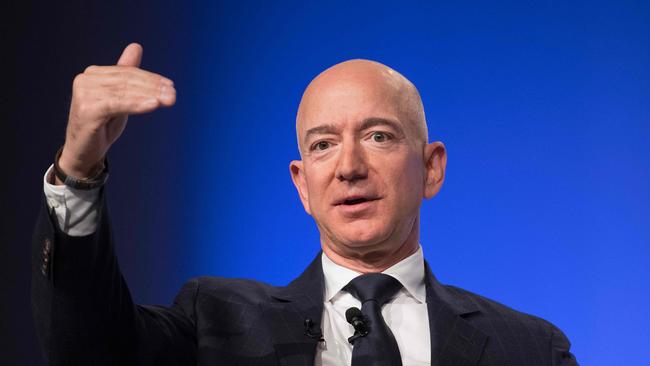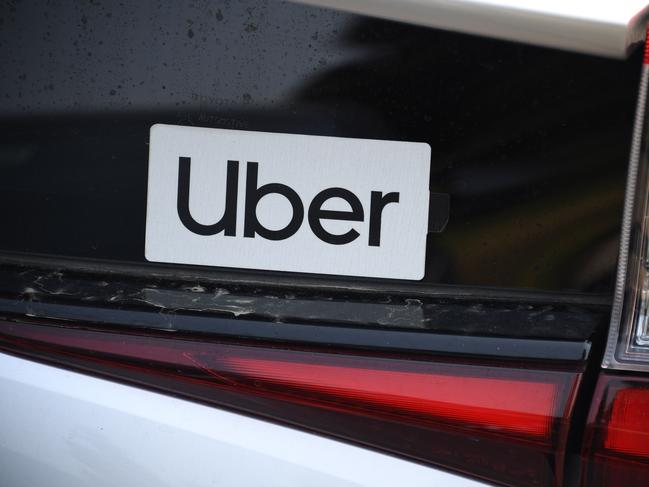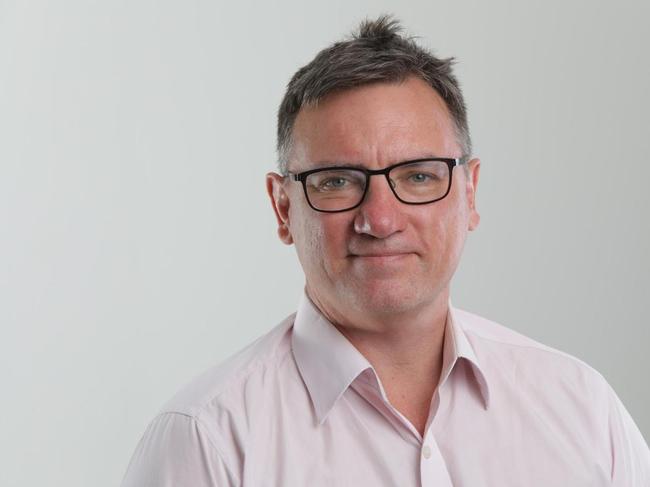Parliament ‘must back media code’
This think tank says the parliament needs to urgently back proposed laws that would force tech giants to pay for news.

Hello and welcome to The Download, The Australian’s technology blog for the latest tech news.
Chris Griffith 4:10pm: Blackberry, Amazon joins forces to store and process vehicle data
BlackBerry and Amazon are joining forces to develop and market BlackBerry’s intelligent vehicle data platform. They say it will let auto makers provide a consistent and secure way to read vehicle sensor data and create insights from the information.
This is a timely announcement at a stage where the market for vehicle data is starting to explode.
“Modern cars and trucks are built with thousands of parts from many different suppliers, so the challenge is that each hardware and software component produces siloed data in specialised formats,” BlackBerry says in a statement. “Additionally, there are highly specific developer skills required to interact with this data, which limits abilities to innovate quickly and bring new solutions to market it.
“BlackBerry IVY will solve for these challenges by applying machine learning to vehicle data to generate predictive insights and inferences, making it possible for automakers to offer in-car experiences that are highly personalised and adaptive based on data-driven insights.”
BlackBerry says IVY will support multiple vehicle operating systems and multi-cloud deployments for compatibility across vehicle models and brands.
Of course this presupposes that car makers will automatically have the right of access to data generated by your car, a proposal that’s getting some blowback in markets such as Europe where much of the data accumulated by cars is regarded as personal data.
Chris Griffith 3.45pm: Apple enables third party family sharing
Until now family sharing was a feature confined to Apple services. Instead of every member of a family individually buying an Apple subscription, an Apple user and up to five family members could pool resources and take out one membership. This applied to Apple services such as Apple Music, Apple TV+, Apple News+, and Apple Arcade.
This is about to expand with Apple telling its developer community that they can set up their subscriptions to accept family subscriptions. “You can now enable Family Sharing for auto-renewable subscriptions and non-consumable in-app purchases, allowing users to share their purchases with up to five family members,” Apple says in an update to developers.
It says there is a benefit to this system. “Family Sharing provides a streamlined, convenient user experience and can help you attract subscribers, encourage paid subscriptions, increase user engagement, and improve retention,” says Apple.
Whether developers embrace this is hard to know. Some will welcome it, but others may have hoped to make more money from individuals buying subscriptiotheir apps. It will be interesting to see how this works out. Apple says sales and trends reports will be updated to help developers understand the performance of family subscriptions.
David Swan 3.30pm: Uber sells self-driving unit
Uber sold its self-driving-car unit to a Silicon Valley competitor, Aurora Innovation., in the latest business exit by the ride-hailing company as it aims to deliver on a promise to shareholders to become profitable.
The two companies on Monday said that as part of the deal for the self-driving-car unit, known as Advanced Technologies Group, or ATG, Uber will make a $US400 million cash investment in Aurora. Uber said it would hold a roughly 26 per cent stake in Aurora on completion of the deal. Uber Chief Executive Dara Khosrowshahi also is joining the company’s board of directors.
Mr Khosrowshahi has moved to restructure Uber to deliver on a promise to make the company profitable, scaling back many of its expensive side businesses—including electric bikes and flying cars—that haven’t gained much traction. Uber has wound down its product incubator and artificial-intelligence lab, exited e-bikes and sold a stake in its unprofitable freight-hauling unit. The company has promised to be profitable on an adjusted basis before interest, taxes, depreciation and amortization by the end of next year.
Uber said ATG, combined with other technology programs, incurred a $US104 million loss in the third quarter on $25 million in revenue.
Aurora is led by autonomous-driving pioneer Chris Urmson, who helped launch Google’s autonomous-driving project. The acquisition bolsters Aurora’s position in an industry that has suffered numerous technical setbacks.

“All of this means that through the combination of our companies, we jump to be the top player in our space. It’s not foregone, but victory is now ours to lose,” Mr Urmson said in an email to Aurora employees on Monday.
After the acquisition and Uber investment, Aurora has a valuation of about $10 billion, according to a person with knowledge of the matter. That is up from a slightly more than $US2.5 billion valuation in 2019.
The purchase of ATG, Aurora said, “will accelerate our mission and the delivery of our first product safety, quickly and broadly.”
Uber’s Mr Khosrowshahi said that Aurora is now “in pole position to deliver” on the promise of self-driving technology.
Mr Urmson has said he plans to first focus on the rollout of self-driving technology for heavy-duty trucks. Autonomous passenger vehicles will follow, and the partnership with Uber gives Aurora a clearer path to launch the technology with a ride-hailing service, said Mr. Urmson.
ATG has partnerships with Toyota Motor Corp. and Volvo Cars, using their vehicles to test its autonomous technology.
Uber’s sale of the self-driving unit caps a tumultuous period for the business. It was once led by Anthony Levandowski, who this year was charged and sentenced to 18 months in federal prison for stealing self-driving trade secrets from Alphabet Inc’s Google, his former employer. In 2018, an Uber self-driving car, with a safety driver in the front seat, hit and killed a woman crossing the street in Tempe, Ariz. The crash caused Uber to pause its self-driving tests and abandon its operation in Arizona. The incident delivered a setback to the entire industry.
Federal investigators who probed the crash found the Uber vehicle had failed to identify the pedestrian or to brake, raising serious questions about safety protocols at the company and the performance of its technology.
Successfully building self-driving passenger cars has been portrayed as crucial to Uber’s future as a transportation platform. Uber’s co-founder and former CEO, Travis Kalanick, once called the company’s ability to build self-driving cars an “existential” challenge, expecting the entire automobile industry would eventually be autonomous.
The company rolled out its first self-driving test cars in Pittsburgh in 2016, where ATG is based.
Aurora, which also has an office in Pittsburgh, said it plans to retain the majority of ATG’s 1,200 workforce, expanding its roughly 600-person staff.
The competition to deploy self-driving cars has intensified in recent months. Waymo LLC has this year announced around $3 billion in outside investments to bolster its finances as it races to develop self-driving vehicles. The company in October said it was opening its driverless service to the general public in Phoenix.
David Swan 2.30pm: Parliament ‘must back media code’
The federal parliament has a responsibility to back the government and ACCC’s proposed media bargaining code, according to tech think tank Centre for Responsible Technology.
The group’s director Peter Lewis is urging Australians to contact their local MPs and senators to vote in favour of the legislation, to be introduced to parliament by Treasurer Josh Frydenberg on Wednesday. The organisation is planning on buying full-page ads over the next few days backing the code.
Mr Lewis said the laws would give media organisations a ‘fighting chance’ in the face of market domination from so-called big tech.
The laws, which are expected to gain support from across the political spectrum, would force tech giants Facebook and Google to compensate media publishers - including the ABC and SBS - for using their news.
“Around the globe, politics has been brutalised by the transfer of facet-based public discourse to private networks fuelled by disinformation and division,” Mr Lewis said.

“Throughout 2020 Australia’s trust in both government and media has improved, yet the media companies who delivered this information have gotten weaker with waves of closures and job cuts.
“The News Media Bargaining Code is an attempt to rebalance the equation – with platforms recognising the value of facts via a bargaining deal that would fund journalism into the future.
“This legislation demands cross-party support: a clear statement from all our elected representatives that will stand up for democracy. We know the big tech companies have been working hard to stop these changes and we can expect more threats over the summer.
“While it will be important to scrutinise the details of the legislation, and the Centre for Responsible Technology will be doing so, it is critical that all parties get behind the code to ensure its passage in early 2021.”
The legislation, which was flagged by Mr Frydenberg in April, will be referred to a Senate committee for further consideration.
David Swan 11.30am: Apple asks for Federal Court dismissal
Tech giant Apple has asked that an Australian case brought against it be by Fortnite maker Apple be thrown out by the Federal Court, arguing that the legal tussle should be limited to California.
Epic Games is taking on Apple in the Federal Court over its 30 per cent app store fee, and alleging Apple has breached both Australian Consumer Law and the Competition and Consumer Act.
In a case described by Epic founder and CEO Tim Sweeney as the most significant of this decade, Epic says Apple has an absolute monopoly over its mobile app store, and that Apple’s 30 per cent cut of in-app purchases is exorbitant. Apple has defended the fees as being in line with other retailers.
At a case management hearing on Tuesday Apple asked for a stay of proceedings, given the two companies are embroiled in a similar battle in California.
Epic’s counsel argued there has been significant “competitive harm” to Australian iOS users so it‘s appropriate the action be brought before an Australian court.
The court declined to throw out the case, setting a provisional hearing date for March 2021, before the California case, slated for May, will have started.

Justice Nye Perram also flagged that he has an iPhone, though neither sides said that would be an issue.
“It’ll come as no great surprise to you, I have an iPhone and I have an Apple Pay account. I don’t think that creates any difficulties.”
Earlier this year Apple banned Fortnite from its app store after Epic launched its own in-app payment system, circumventing Apple’s purchasing systems. Epic then launched a suit in a California district court which is now heading towards a trial in May next year.
ACCC chair Rod Sims previously told The Australian Epic’s case would be a significant test of Section 46 of the Competition and Consumer Act, which prohibits firms that hold significant market power from lessening competition. “This is a matter of great interest to us,” Mr Sims said.
Apple and Google are already facing a showdown with Australia’s competition watchdog next year. The ACCC is investigating multiple issues including the use and sharing of data by apps, the extent of competition between Google and Apple’s app stores, and whether more pricing transparency is needed in Australia’s mobile apps market.
“If you’re going to be in the app business, you’ve probably got to be on (Apple or Google’s) stores. Epic are claiming they’re being forced to use Apple’s payment system, rather than their own, and it’s a really interesting issue about when positions of market power cross a line,” Mr Sims said.
David Swan 10am: Amazon picks Melbourne for new hub
US tech giant Amazon has chosen Melbourne for a new AWS cloud infrastructure region, an investment it says will likely contribute billions of dollars to the Victorian tech economy in the next 10 years as the state moves to recover from the devastating coronavirus pandemic.
The company’s Melbourne data centre will open in the second half of 2022 and create 90 jobs in the immediate future, joining its existing Sydney region – launched in 2012 – and eight regions in total across Asia Pacific.
Amazon says it has invested $3 billion into Australia over the past decade, a number that is set to skyrocket as businesses across the country complete digital transformations and shift their workloads the cloud.

AWS has hundreds of thousands of customers locally including CBA, Woodside, David Jones, NAB, Testra, Qantas, Atlassian and Canva, and a second local AWS region will mean higher speeds and greater resiliency for those companies.
“A second region in Australia will give AWS customers the ability to build applications with greater fault tolerance resiliency, and even reduce latency for critical cloud workloads,” Amazon Web Services local managing director Adam Beavis said.
“The new AWS Melbourne region will provide us with the opportunity to continue to create further jobs in Australia, including the new data centre operators and technical engineers. We’re passionate about improving skills of the local developers and students and supporting the next generation of IT leaders.”
Terms of any arrangement with the Victorian government to bring AWS to Victoria were not disclosed.
Minister for Economic Development Tim Pallas said the investment was proof the state was ‘not sitting back’ when it comes to bouncing back from COVID-19.
“This new AWS Region will draw on our highly-skilled people and renowned capabilities in growing employment fields such as cloud computing. Attracting companies like AWS will strengthen our reputation as a tech leader, create Victorian jobs and help drive our economic recovery,” Mr Pallas said.
Alex Birch, co-founder of Internet of Things start-up XY Sense, said his company was expanding in Melbourne and was turning to AWS to ramp up its big data infrastructure.
“They help us cost effectively process almost 5 billion anonymous data points in office buildings across Australia,” he said. “AWS is a must-have for start-ups and a second local region will be a powerful launchpad for other budding entrepreneurs in the Victorian start-up community, this announcement means exciting things for the tech ecosystem here in Australia.”
AWS announced a climate pledge in September 2019 to achieve net zero carbon output by 2040, and has announced two new Australian renewable energy projects to help it achieve its goal.
“Globally we have a goal to draw 100 per cent of our energy needs from renewable resources by 2030 and we‘re on the path to do that by 2025,” Mr Beavis said.
“In total [the projects] will combine 165MW of capacity, enough to power 63,000 average Australian homes each year.”



To join the conversation, please log in. Don't have an account? Register
Join the conversation, you are commenting as Logout